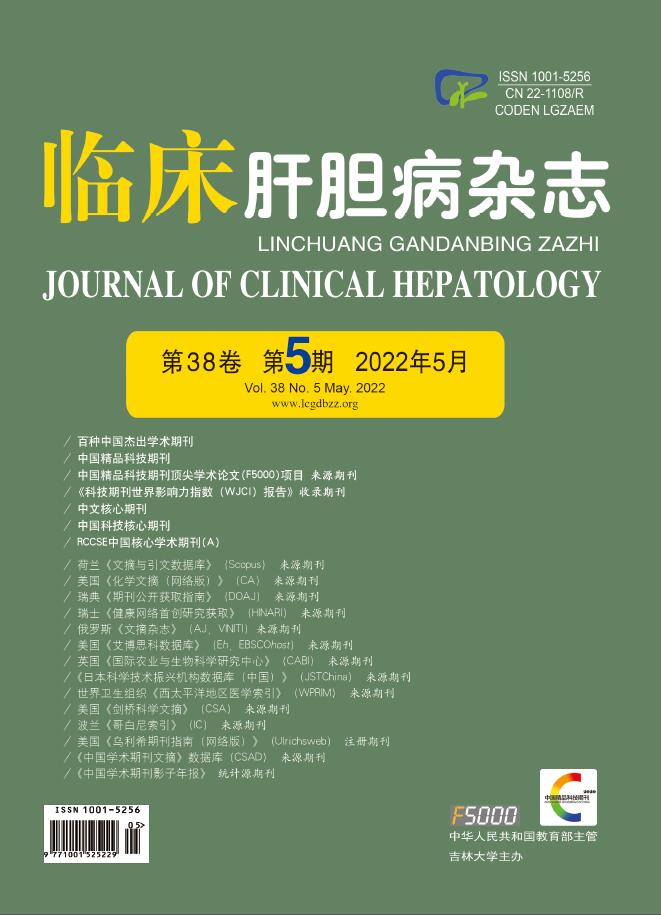| [1] |
SUNG H, FERLAY J, SIEGEL RL, et al. Global Cancer Statistics 2020: GLOBOCAN Estimates of incidence and mortality worldwide for 36 cancers in 185 countries[J]. CA Cancer J Clin, 2021, 71(3): 209-249. DOI: 10.3322/caac.21660. |
| [2] |
LU JC, ZENG HY, SUN QM, et al. Distinct PD-L1/PD1 profiles and clinical implications in intrahepatic cholangiocarcinoma patients with different risk factors[J]. Theranostics, 2019, 9(16): 4678-4687. DOI: 10.7150/thno.36276. |
| [3] |
VALLE J, WASAN H, PALMER DH, et al. Cisplatin plus gemcitabine versus gemcitabine for biliary tract cancer[J]. N Engl J Med, 2010, 362(14): 1273-1281. DOI: 10.1056/NEJMoa0908721. |
| [4] |
ABOU-ALFA GK, SAHAI V, HOLLEBECQUE A, et al. Pemigatinib for previously treated, locally advanced or metastatic cholangiocarcinoma: A multicentre, open-label, phase 2 study[J]. Lancet Oncol, 2020, 21(5): 671-684. DOI: 10.1016/S1470-2045(20)30109-1. |
| [5] |
FENG YH. Updated analysis with longer follow up of a phase 2a study evaluating erdafitinib in Asian patients (pts) with advanced cholangiocarcinoma (CCA) and fibroblast growth factor receptor (FGFR) alterations[R]. 2022 ASCO GI430#
|
| [6] |
ABOU-ALFA GK, MACARULLA T, JAVLE MM, et al. Ivosidenib in IDH1-mutant, chemotherapy-refractory cholangiocarcinoma (ClarIDHy): A multicentre, randomised, double-blind, placebo-controlled, phase 3 study[J]. Lancet Oncol, 2020, 21(6): 796-807. DOI: 10.1016/S1470-2045(20)30157-1. |
| [7] |
GUO XJ, LU JC, ZENG HY, et al. CTLA-4 synergizes with PD1/PD-L1 in the inhibitory tumor microenvironment of intrahepatic cholangiocarcinoma[J]. Front Immunol, 2021, 12: 705378. DOI: 10.3389/fimmu.2021.705378. |
| [8] |
HASLAM A, PRASAD V. Estimation of the percentage of US patients with cancer who are eligible for and respond to checkpoint inhibitor immunotherapy drugs[J]. JAMA Netw Open, 2019, 2(5): e192535. DOI: 10.1001/jamanetworkopen.2019.2535. |
| [9] |
HOOS A. Development of immuno-oncology drugs - from CTLA4 to PD1 to the next generations[J]. Nat Rev Drug Discov, 2016, 15(4): 235-247. DOI: 10.1038/nrd.2015.35. |
| [10] |
MOTZER RJ, TANNIR NM, MCDERMOTT DF, et al. Nivolumab plus ipilimumab versus sunitinib in advanced renal-cell carcinoma[J]. N Engl J Med, 2018, 378(14): 1277-1290. DOI: 10.1056/NEJMoa1712126. |
| [11] |
OVERMAN MJ, MCDERMOTT R, LEACH JL, et al. Nivolumab in patients with metastatic DNA mismatch repair-deficient or microsatellite instability-high colorectal cancer (CheckMate 142): An open-label, multicentre, phase 2 study[J]. Lancet Oncol, 2017, 18(9): 1182-1191. DOI: 10.1016/S1470-2045(17)30422-9. |
| [12] |
OVERMAN MJ, LONARDI S, WONG K, et al. Durable clinical benefit with nivolumab plus ipilimumab in DNA mismatch repair-deficient/microsatellite instability-high metastatic colorectal cancer[J]. J Clin Oncol, 2018, 36(8): 773-779. DOI: 10.1200/JCO.2017.76.9901. |
| [13] |
SCHMID P, ADAMS S, RUGO HS, et al. Atezolizumab and nab-paclitaxel in advanced triple-negative breast cancer[J]. N Engl J Med, 2018, 379(22): 2108-2121. DOI: 10.1056/NEJMoa1809615. |
| [14] |
GANDHI L, RODRÍGUEZ-ABREU D, GADGEEL S, et al. Pembrolizumab plus chemotherapy in metastatic non-small-cell lung cancer[J]. N Engl J Med, 2018, 378(22): 2078-2092. DOI: 10.1056/NEJMoa1801005. |
| [15] |
NAKAMURA H, ARAI Y, TOTOKI Y, et al. Genomic spectra of biliary tract cancer[J]. Nat Genet, 2015, 47(9): 1003-1010. DOI: 10.1038/ng.3375. |
| [16] |
ZHOU G, SPRENGERS D, MANCHAM S, et al. Reduction of immunosuppressive tumor microenvironment in cholangiocarcinoma by ex vivo targeting immune checkpoint molecules[J]. J Hepatol, 2019, 71(4): 753-762. DOI: 10.1016/j.jhep.2019.05.026. |
| [17] |
SILVA VW, ASKAN G, DANIEL TD, et al. Biliary carcinomas: Pathology and the role of DNA mismatch repair deficiency[J]. Chin Clin Oncol, 2016, 5(5): 62. DOI: 10.21037/cco.2016.10.04. |
| [18] |
MARABELLE A, LE DT, ASCIERTO PA, et al. Efficacy of pembrolizumab in patients with noncolorectal high microsatellite instability/mismatch repair-deficient cancer: Results from the phase Ⅱ KEYNOTE-158 study[J]. J Clin Oncol, 2020, 38(1): 1-10. DOI: 10.1200/JCO.19.02105. |
| [19] |
PIHA-PAUL SA, OH DY, UENO M, et al. Efficacy and safety of pembrolizumab for the treatment of advanced biliary cancer: Results from the KEYNOTE-158 and KEYNOTE-028 studies[J]. Int J Cancer, 2020, 147(8): 2190-2198. DOI: 10.1002/ijc.33013. |
| [20] |
KIM RD, CHUNG V, ALESE OB, et al. A Phase 2 multi-institutional study of nivolumab for patients with advanced refractory biliary tract cancer[J]. JAMA Oncol, 2020, 6(6): 888-894. DOI: 10.1001/jamaoncol.2020.0930. |
| [21] |
|
| [22] |
KEMP A. Imfinzi plus chemotherapy significant improved overall survival in 1st-line advanced biliary tract cancer in TOPAZ-1 phase Ⅲ trial at interim analysis[EB/OL]. (2021-10-25). News release. AstraZeneca. https://bit.ly/3vMk79. |







 DownLoad:
DownLoad: